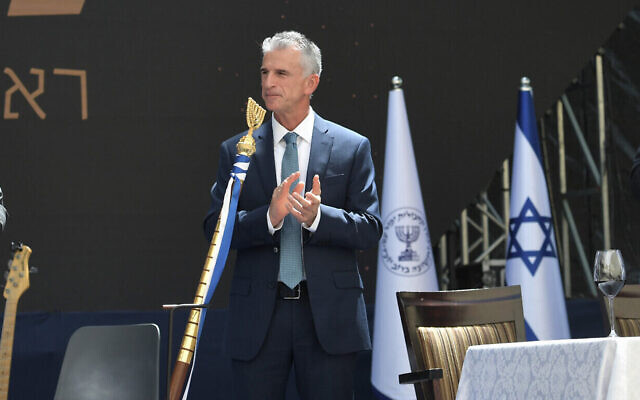Mossad – Google News | David Barnea | Yossi Cohen
Three senior officials reportedly quit Mossad over moves by new spy chief
Three senior officials in the Mossad espionage agency have resigned over decisions made by the organization’s new director, David Barnea, according to a Thursday report.
The resignations took place in the past few weeks, Channel 13 reported.
Barnea took over as director of the intelligence agency from Yossi Cohen in June.
The officials who left the agency were three of its most senior officials, holding the comparative rank of major-general in the military, the report said.
Those said to have quit include the head of the technology division, the head of operations and the head of the branch dealing with the anti-terror war. A fourth senior official is reportedly considering quitting as well.
The resignation of the officials was said to be directly linked to organizational decisions made by Barnea to divide up responsibilities in the spy agency and split existing branches.
Barnea, who is also known by his nickname Dedi, served as a combat soldier in the elite Sayeret Matkal commando unit and has been in the Mossad for the past 25 years, including in prominent operational roles that saw him rise to lead the branch that handles the organization’s agents worldwide. He was appointed Cohen’s deputy in 2019.
Announcing Barnea’s appointment in May, then prime minister Benjamin Netanyahu said his top task was “to prevent Iran from acquiring nuclear weapons.”
Cohen had served as head of the Mossad since January 2016. He was considered a close confidante to Netanyahu, reportedly served as the former prime minister’s special envoy for various tasks, and was said to be seen by Netanyahu as his preferred successor as prime minister.
Cohen played a prominent role in last year’s deals to normalize ties with Arab countries. He traveled to the United Arab Emirates and Bahrain, as the US brokered deals between them and Israel.
In Streetwise Hebrew for the Times of Israel Community, each month we learn several colloquial Hebrew phrases around a common theme. These are bite-size audio Hebrew classes that we think you’ll really enjoy.
This month, we’re learning phrases on the topic of strength and power. Ready to get tough with us?
Learn more Learn more Already a member? Sign in to stop seeing this
Warning: Graphic content
Horrific new footage appears to show inside Russia’s “torture conveyor belt” jails where it’s claimed inmates are raped and mutilated.
The new video was leaked to campaigners and allegedly shows prisoners being terrorized and subject to degrading treatment in Vladimir Putin’s jails.
The videos show at least five inmates being urinated on, raped and violated with blunt objects.
They are the latest in a series taken by a Belarussian man jailed in Saratov and leaked to campaigners Gulagu.net.
According to the group, the abuse took place in OTB-1, a prison the Saratov region, close to the border with Kazakhstan.
Vladimir Osechkin, who runs the group, wrote on its website: “We continue our independent investigation against the conveyor belt of torture in the institutions of the Federal Penitentiary Service.”
The group claims gangs of rapists were employed at the prison hospital to provide cover for them if their presence was questioned.
But it’s alleged their actual job was the routine sexual abuse of inmates as part of a “criminal conspiracy” operating within the jail.
The rapes were filmed and the footage sent to the security services so it could be archived and then used as blackmail.
It comes after the Gulagu revealed sickening video showing a naked man screaming in pain as he is tied to a bed and violated with a mop handle at a tuberculosis hospital in the jail.
The video was taken by Sergei Savelyev, who was used by the authorities to collate their sickening collection of torture videos filmed on prison issue camcorders, says the group.
The IT programmer was “beaten and tortured himself” before he was deployed as a “professional” to file the collection of abusive videos from several regions, it was claimed.
Savelyev – now released and seeking political asylum in the West – copied the material and carried it out of Russia.
Brutal treatment
Osechkin says prisoners “themselves become part of the torture machine” by snitching on other inmates or by signing false testimonies prepared by investigators.
The footage has reportedly led to the head of Russia’s FSIN prison service quitting.
Tanya Lokshina, of Human Rights Watch, said her organization could not verify the videos but the footage “gave grounds for strong concern.”
“The problem of torture in Russian penitentiaries is very acute and the government is not doing enough to ensure effective investigation, security of victims and whistleblowers and accountability for perpetrators,” she said.
Russian prisons are notoriously brutal and reports surfaced earlier this year detailing how prisoners were subject to electric shocks and had clamps attached to their penises.
A Putin-backed sadist dubbed The Maniac allegedly ran a prison in war-torn Ukraine which had dungeons where victims were mutilated with surgical tools.
Senior French officials will host the Russian foreign and defense ministers for talks in Paris on November 12 on Ukraine, Russia’s activities in West Africa, and the Iranian nuclear program, the French government announced on November 9.
French Foreign Minister Jean-Yves Le Drian and Defense Minister Florence Parly will meet their Russian counterparts Sergei Lavrov and Sergei Shoigu on the sidelines of a conference on Libya, a French statement said.
The meeting will be the first in the so-called “2+2” format of foreign and defense ministers since last year’s poisoning of opposition leader Aleksei Navalny brought relations between Russia and the West to a new low.
France canceled a similar meeting it was due to host with Lavrov and Shoigu in September last year in the aftermath of the poisoning.
Western countries accused Moscow of using a nerve agent to try to kill Navalny, and the European Union imposed sanctions on Russian officials following the incident.
Navalny and his supporters say the poisoning was carried out by Russian Federal Security Service (FSB) operatives at the behest of President Vladimir Putin in retribution for Navalny’s political activities. The Kremlin has denied any role in the incident.
Navalny was subsequently imprisoned earlier this year on charges that he and his supporters say are politically motivated.
However, French President Emmanuel Macron has long sought a dialogue with Putin, considering it unwise to shun Russia in the international arena.
“This meeting is part of the demanding dialogue that France continues with Russia,” the statement from the French foreign and defense ministries said.
It said that the French ministers would notably raise concerns over Russian actions in Africa, where observers say Russian mercenaries are operating in an area where French troops are also deployed.
Based on reporting by AFP and TASS
The US embassy in Moscow could stop performing most functions next year unless there is progress with Russia on increasing the number of visas for diplomats, a US official has warned.
The United States earlier this month stopped processing visas in Moscow, and Russians are obliged to travel to the US embassy in Warsaw.
“We need to make progress soon,” a senior state department official told reporters.
“We’re going to confront the situation – not next month, but sometime next year – where it’s just difficult for us to continue with anything other than a caretaker presence at the embassy,” he said.
“We will do everything humanly possible to keep that mission open,” he said, while warning that more functions of the embassy, such as sending diplomatic cables, would become difficult without more staff.
Russia and the United States withdrew their ambassadors in April after the incoming Biden administration issued sanctions and expelled 10 Russian diplomats over actions including the SolarWinds cyber attack and election interference.
Those ambassadors returned in June, but the staff at the embassy in Moscow – the last operational US mission in the country after consulates in Vladivostok and Yekaterinburg were shuttered – has shrunk to 120 from about 1,200 in early 2017, the state department official told reporters at a briefing.
He said that the United States lacked staff for basic tasks such as opening and closing the embassy gates, ensuring secure telephone calls and operating the elevators.
Russia on 1 August barred embassies from hiring Russian or third-country staff, forcing the United States to lay off more than 200 locals at missions across Russia, according to the state department.
The United States complains of a lack of reciprocity with Moscow, which counts local staff in its tally of US diplomats, while Washington only factors in Russian nationals in its limit on numbers.
The United States has about 120 people at its Russian missions, far down from 1,200 in 2017, while Russia has 230 people in the United States, excluding those posted in New York for its UN mission.
“They have a much bigger presence here in the United States than we have in Russia,” the official said.
Russia and the United States continue to engage in talks over nuclear threat reduction and climate change, but relations remain strained by issues like the Nord Stream 2 gas pipeline to Europe and Vladimir Putin’s suppression of his domestic opponents.
The Jewish Week via JTA — It’s official: Eric Adams will become the 110th mayor of New York City and the city’s second Black mayor — even as one major bloc of Jewish voters spurned him.



